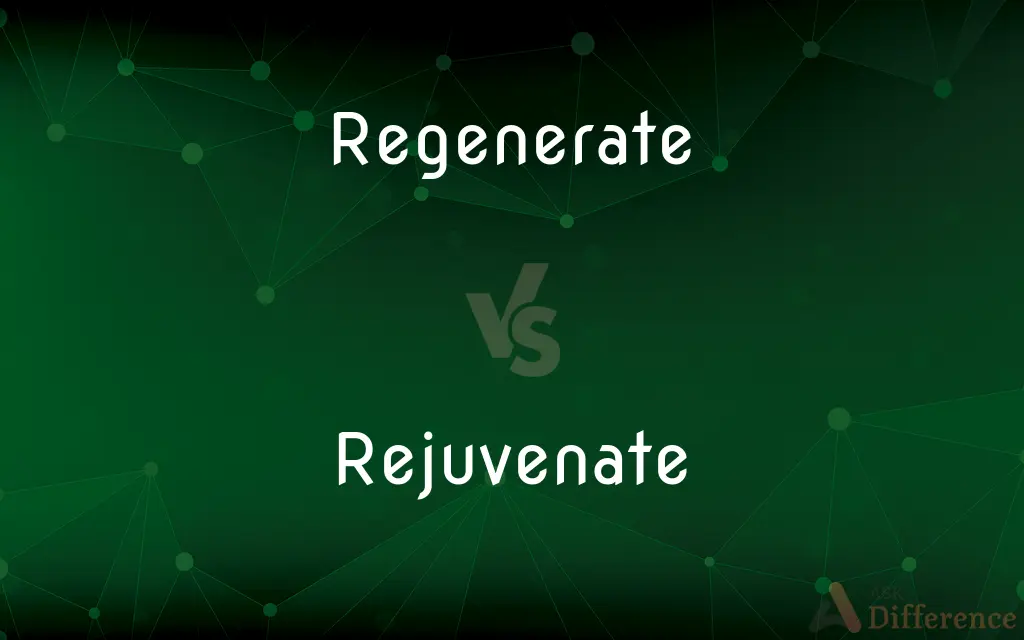Regenerate vs. Rejuvenate — What's the Difference?
By Urooj Arif & Fiza Rafique — Updated on April 24, 2024
Regenerate means to recreate lost or damaged tissues or structures, while rejuvenate involves restoring vitality and freshness without structural change.

Difference Between Regenerate and Rejuvenate
Table of Contents
ADVERTISEMENT
Key Differences
Regeneration involves the biological process of replacing or regrowing lost or damaged tissues, organs, or cells to restore normal function. On the other hand, rejuvenation focuses on revitalizing existing tissues and improving overall vitality and appearance, often used in the context of aging or wear.
While regeneration can occur at various biological levels, including cellular and organ-level, rejuvenation primarily enhances the existing condition and functioning of cells and tissues, often delaying signs of aging or wear. This distinction points to regeneration's role in medical and biological recovery, whereas rejuvenation is more commonly associated with aesthetics and wellness.
Regeneration is crucial in medical treatments, facilitating recovery from injuries such as burns or amputations by promoting the growth of new tissues. Conversely, rejuvenation techniques, such as skincare or wellness therapies, aim to improve appearance and well-being without fundamentally altering the body’s structure.
The mechanisms underlying regeneration involve complex biological processes including stem cell activity and growth factors. In contrast, rejuvenation might involve practices like better nutrition, exercise, or cosmetic procedures, focusing more on enhancing quality rather than restoring form.
Regenerative processes are often associated with substantial recovery times and may require medical interventions. Rejuvenation efforts, on the other hand, can often be undertaken as part of routine health and beauty regimens, offering improvements with minimal to no downtime.
ADVERTISEMENT
Comparison Chart
Definition
To regrow or replace lost or damaged tissues or organs
To restore vitality and freshness
Focus
Structural restoration and functional recovery
Enhancing appearance and well-being
Biological Process
Involves cell regeneration, growth factors
Focuses on improving existing cell conditions
Common Context
Medical recovery, biological research
Aesthetics, anti-aging, wellness
Outcome
Restoration of original function
Improved condition and reduced signs of aging
Compare with Definitions
Regenerate
To renew or restore a lost, removed, or injured body part.
Scientists are studying how to help humans regenerate damaged tissues.
Rejuvenate
To make someone look or feel younger, fresher, or more lively.
A good night’s sleep can rejuvenate the mind and body.
Regenerate
To regrow lost or damaged body parts naturally.
Starfish can regenerate lost arms.
Rejuvenate
To revitalize or breathe new life into something.
The company's new management has rejuvenated its branding.
Regenerate
To restore something that has been damaged.
Forests can regenerate after a fire if protected from further harm.
Rejuvenate
To refresh or revive.
After the retreat, she felt completely rejuvenated.
Regenerate
To form new tissue or organ through biological processes.
Research shows that certain lizards can regenerate their tails.
Rejuvenate
To give new energy or vigor to something.
The spa treatments rejuvenated her after a stressful week.
Regenerate
To undergo renewal or restoration.
The liver has a remarkable capacity to regenerate itself.
Rejuvenate
To restore to an original or new condition.
Renovations have rejuvenated the old theater.
Regenerate
(Biology) To replace (a lost or damaged organ or part) by the formation of new tissue.
Rejuvenate
To restore to youthful vigor or appearance; make young again.
Regenerate
To form, construct, or create anew
Any part of the hologram can be used to regenerate the whole image.
Rejuvenate
To restore to an original or new condition
Rejuvenate an old sofa.
Regenerate
To give new life or energy to; revitalize
A new book to regenerate the flagging interest of his readers.
Rejuvenate
To stimulate (a stream) to renewed erosive activity, as by uplift of the land.
Regenerate
To reform spiritually or morally
"The sacraments come from God and regenerate the person" (Radclyffe Hall).
Rejuvenate
To develop youthful topographic features in (a previously leveled area).
Regenerate
To effect regeneration
Can the damaged nerves regenerate?.
Rejuvenate
To render young again.
Regenerate
To become formed or constructed again.
Rejuvenate
To give new energy or vigour to; to revitalise.
Regenerate
To undergo spiritual conversion or rebirth; reform.
Rejuvenate
To render young again.
Regenerate
Spiritually or morally reformed.
Rejuvenate
Cause (a stream or river) to erode, as by an uplift of the land
Regenerate
Formed by regeneration
Regenerate tissue.
Rejuvenate
Develop youthful topographical features;
The land rejuvenated
Regenerate
(transitive) To construct or create anew, especially in an improved manner.
Rejuvenate
Make younger or more youthful;
The contact with his grandchildren rejuvenated him
Regenerate
(transitive) To revitalize.
Rejuvenate
Return to life; get or give new life or energy;
The week at the spa restored me
Regenerate
To replace lost or damaged tissue.
Rejuvenate
Become young again;
The old man rejuvenated when he became a grandfather
Regenerate
(intransitive) To become reconstructed.
Regenerate
(intransitive) To undergo a spiritual rebirth.
Regenerate
(intransitive) Of a water softener: to flush out the minerals extracted from the water supply.
Regenerate
Spiritually reborn.
Regenerate
(obsolete) Reproduced.
Regenerate
One who is spiritually reborn.
Regenerate
Born anew; become Christian; renovated in heart; changed from a natural to a spiritual state.
Regenerate
To generate or produce anew; to reproduce; to give new life, strength, or vigor to.
Through all the soil a genial fferment spreads.Regenerates the plauts, and new adorns the meads.
Regenerate
To cause to be spiritually born anew; to cause to become a Christian; to convert from sin to holiness; to implant holy affections in the heart of.
Regenerate
Hence, to make a radical change for the better in the character or condition of; as, to regenerate society.
Regenerate
Re-establish on a new, usually improved, basis or make new or like new;
We renewed our friendship after a hiatus of twenty years
They renewed their membership
Regenerate
Amplify (an electron current) by causing part of the power in the output circuit to act upon the input circuit
Regenerate
Bring, lead, or force to abandon a wrong or evil course of life, conduct, and adopt a right one;
The Church reformed me
Reform your conduct
Regenerate
Return to life; get or give new life or energy;
The week at the spa restored me
Regenerate
Replace (tissue or a body part) through the formation of new tissue;
The snake regenerated its tail
Regenerate
Be formed or shaped anew
Regenerate
Form or produce anew;
Regenerate hatred
Regenerate
Undergo regeneration
Regenerate
Restore strength;
This food revitalized the patient
Regenerate
Reformed spiritually or morally;
A regenerate sinner
Regenerate by redemption from error or decay
Common Curiosities
Can regeneration be artificially stimulated?
Yes, medical interventions and research are exploring ways to artificially stimulate regeneration for therapeutic purposes.
What is the main purpose of rejuvenation?
Rejuvenation aims to restore vitality and freshness, improving overall appearance and well-being.
How does regeneration differ from healing?
Regeneration fully restores the original structure and function of damaged tissues, while healing might only repair damage without complete restoration.
What examples of regeneration are there in nature?
Many amphibians and some reptiles can regenerate limbs, tails, and even parts of their hearts.
What are common methods of rejuvenation?
Common methods include skincare treatments, dietary changes, and wellness therapies.
How can someone enhance their rejuvenation efforts?
Enhancing rejuvenation efforts can include adopting a healthy lifestyle, using anti-aging products, and managing stress.
What are the benefits of rejuvenation therapies?
Benefits include improved physical appearance, increased energy levels, and a general sense of well-being.
Are rejuvenating treatments usually invasive?
They can range from non-invasive options like skincare to minimally invasive procedures like injectables.
What factors affect the body's ability to regenerate?
Factors include age, health, genetic makeup, and the extent of the damage.
What does regenerate mean?
Regenerate refers to the biological process of regrowing or replacing lost or damaged tissues or organs.
What scientific disciplines study regeneration?
Disciplines such as developmental biology, regenerative medicine, and stem cell research focus on understanding and harnessing regeneration.
What role does stem cell research play in regeneration?
Stem cell research is crucial in understanding and applying regenerative processes to medical treatments.
Can rejuvenation treatments reverse aging?
While they cannot reverse aging, rejuvenation treatments can mitigate its visual and physical effects.
Is rejuvenation only concerned with appearance?
While commonly associated with appearance, rejuvenation also involves improving the functional vitality of the body and mind.
How do preventative care and rejuvenation relate?
Preventative care can enhance rejuvenation efforts by maintaining better overall health and reducing the onset of age-related issues.
Share Your Discovery

Previous Comparison
Merchant vs. Vendor
Next Comparison
Laugh vs. SmileAuthor Spotlight
Written by
Urooj ArifUrooj is a skilled content writer at Ask Difference, known for her exceptional ability to simplify complex topics into engaging and informative content. With a passion for research and a flair for clear, concise writing, she consistently delivers articles that resonate with our diverse audience.
Co-written by
Fiza RafiqueFiza Rafique is a skilled content writer at AskDifference.com, where she meticulously refines and enhances written pieces. Drawing from her vast editorial expertise, Fiza ensures clarity, accuracy, and precision in every article. Passionate about language, she continually seeks to elevate the quality of content for readers worldwide.
















































